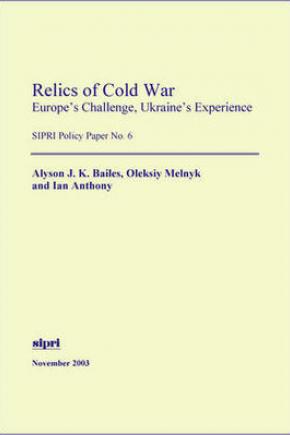Relics of Cold War: Europe's Challenge, Ukraine's Experience
This policy paper was supported by the Bonn International Center for Conversion (BICC), whose Director has co-signed the preface. It is the forerunner for a planned research project in 2004, leading to a book-length publication, in which BICC will be SIPRI's principal partner.
In 2004 Europe will consign the cold war to history in the most emphatic way possible, with the enlargement on a grand scale of both the European Union (EU) and the North Atlantic Treaty Organization (NATO). Contrary to many expectations, this massive expansion of institutions founded on the Western side of the former Iron Curtain is not taking place at the price of new divisions with, or the alienation of, Russia. The Russian Federation's own relations with the EU and NATO are being enhanced, and both institutions are developing 'new neighbour' strategies designed to share a least some of the benefits of integration with non-members along their new eastern frontiers. Other states born from the break-up of the Soviet Union, such as Ukraine, have been offered a more benign environment to explore their own European vocation than anyone could have predicted at the time when the cold war approached its end, just 15 years earlier.
The political transformation of Europe has been accompanied by profound changes in the dimension of security and defence. The problem is that the relics of cold war, even if largely banished from the European vision and spirit, are still all too much present around our feet. Weapons are easier to decommission than to destroy, and soldiers are easier to demobilize than to re-employ. Former military real estate is difficult to clean up and convert, and military force structures and deployment patterns change much more slowly than the strategic environment which in principle should dictate them.
Not every weapon system, soldier or piece of military real estate left from the cold war is dysfunctional or useless today: but bad planning, neglect, ignorance and lack of resources have left Europe burdened with large relict capacities suited neither to the spirit nor the practical needs of the new environment. For the nations which hold them, such leftovers may represent an embarrassment, an economic burden or at worst a threat to health and safety and to the local environment. If items from them are transferred (legally or illegally) to other regions, however, they could still play a role in sparking and aggravating new conflict. In criminal or terrorist or 'rogue state' hands they could rebound very directly against Europe's own security. The challenge is therefore one which an enlarged Europe and its neighbours cannot afford to ignore, and the current debate over Europe's security interaction with the rest of the world lends it an extra urgency.
This SIPRI Policy Paper aims to illuminate the problem, and to provide a basis for debate on future policy approaches, through a general review of the challenges followed by a detailed case study of the scale, impact and policy handling of the cold war's defence-related legacy in Ukraine. We would like to thank the Ukrainian Centre for Economic & Political Studies (UCEPS) Razumkov Centre in Kyiv for essential support and author Oleksiy Melnyk for his personal contribution, as well as co-author Ian Anthony, who worked on the text at SIPRI. We hope that this paper will be the forerunner of a detailed book-length study of all dimensions of the defence legacy of the East-West confrontation in Europe, to be carried out in cooperation principally between SIPRI and the Bonn International Center for Conversion (BICC).
Click here to download Policy Paper No. 6
About the authors
Alyson J. K. Bailes (United Kingdom) became Director of SIPRI in July 2002. She served in the British Diplomatic Service for 33 years, most recently as British Ambassador to Finland. She has spent several periods on detachment outside the Service, including two academic sabbaticals, a two-year period with the British Ministry of Defence, and assignments to the European Union and the Western European Union. Her main analytical interests are politico-military affairs, European integration and Central European affairs. She has published extensively in international journals on these subjects as well as on Chinese foreign policy. Her latest SIPRI publication is Armament and Disarmament in the Caucasus and Central Asia, SIPRI Policy Paper no. 3.
Lt-Colonel (Ret.) Oleksiy Melnyk (Ukraine) is the Editor-in-Chief of the English edition of National Security & Defence at the Ukrainian Centre for Economic & Political Studies' (UCEPS) Razumkov Centre and fully involved in its research activities. He began his military carrier as a jet pilot in the Soviet Air Force in the early 1980s and retired from the position of Deputy Base Commander, Ukrainian Air Force, in 2001. He was among the first group of Ukrainian officers selected for the US-sponsored International Military Education and Training (IMET) Program in 1993 and graduated from the Squadron Officer School, United States Air Force Air University, in 1994. He took part in two United Nations peacekeeping operations in the former Yugoslavia. Consequently, he experienced personally all the issues related to cold war build-up, the end of the cold war, demilitarization, base closure, early retirement, reintegration, and so on. He has been a member of the editorial team for the translation and publishing of the Ukrainian edition of the SIPRI Yearbook since 2001.
Dr Ian Anthony (United Kingdom) is SIPRI Research Coordinator and the Leader of the SIPRI Internet Database on European Export Controls Project. In 1992-98 he was Leader of the SIPRI Arms Transfers Project. His most recent publication for SIPRI is A Future Arms Control Agenda: Proceedings of Nobel Symposium 118, 1999 (2001), for which he is co-editor (with Adam Daniel Rotfeld). He is also editor of the SIPRI volumes Russia and the Arms Trade (1998), Arms Export Regulations (1991) and SIPRI Research Report no. 7, The Future of Defence Industries in Central and Eastern Europe (1994), and author of The Naval Arms Trade (SIPRI, 1990) and The Arms Trade and Medium Powers: Case Studies of India and Pakistan 1947-90 (Harvester Wheatsheaf, 1992). He has written or co-authored chapters for the SIPRI Yearbook since 1988.
1. Military legacies of the cold war in Europe: The general challenge
Alyson J. K. Bailes and Ian Anthony
2. Ukraine's cold war legacy 12 years on: A burden from the past, a problem for the future
Oleksiy Melnyk



